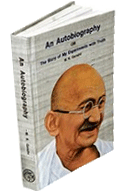
After growing demand from Kashmiris to print Gandhi's autobiography in their regional language, the book is being translated by three scholars. The best translation, which retains the heart of Gandhi's teachings, will be selected and printed.
Managing trustee of Navjivan Trust Vivek Desai says that the Kashmiri translation of Mahatma Gandhi's autobiography aims to take the message of peace and non-violence to a state which has reeled under active terrorism for the past many years now.

































